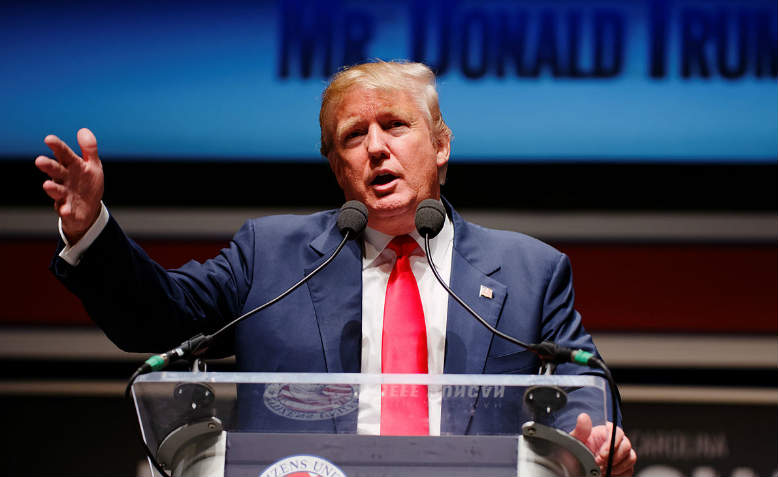 US President Donald Trump. Photo: Wikipedia
US President Donald Trump. Photo: Wikipedia
Just over a hundred days into office and confrontation with imperial rivals is already brewing, writes Chris Nineham
Donald Trump’s serial aggressions are risking international war. His missile attack on Syria was applauded by politicians and commentators across the spectrum, including many liberals. But it was followed by the mega bomb drop on Afghanistan and frightening brinkmanship against North Korea and clearly heralded a turn towards a much more interventionist foreign policy.
These actions can only make the world a more dangerous place. In Syria, the civil war has been further inflamed, and tensions with Russia are at a post-cold war high. Anger against the West has been reignited in Afghanistan and the stand-off with North Korea is dangerous itself, but also dramatically raises the stakes with China.
Of course, socialists are against nuclear weapons anywhere, but threats and provocations against North Korea can only increase the North Korean’s insecurity and the threat of nuclear war.
Trump’s new foreign policy posture is at least partly motivated by domestic concerns. He wants to distance himself from Putin and differentiate himself from Obama. But most of all it marks the fact that the US foreign policy establishment finally reasserted control over Trump.
Consensus
For some time now there has been a broad consensus in Washington that Obama’s foreign policy – for all its horrors – was too weak, that a return to more robust intervention is needed. The argument is twofold. First, the impact of failure in Afghanistan, Iraq, Libya and Syria can only be overcome by new and aggressive military initiatives. Second, that the US and its allies need to up their game to counter the growing threat of China and a newly assertive Russia.
So, despite Trump’s image as an isolationist, what we are actually getting is military and rhetorical escalation on many fronts. Before the attack on Syria, he had already stepped up US participation in the Saudi war on Yemen, deployed conventional troops in Syria for the first time, ramped up drone attacks across the board, and sharply increased US involvement in the attack on Mosul in Iraq. One of the results has been that according to the Syrian Network for Human Rights, more civilians caught up in the Syrian conflict are being killed by US-led coalitions than by Isis or Russian-led forces.
Another clear sign that he is fully on message is Trump’s change of tack on NATO, which he has said is ‘no longer obsolete’. And he has backed words with actions, supporting Montenegro’s bid to join NATO, a move which hawkish US senator John McCain linked directly to the need to confront Russia.
Reactionary
Of course, this doesn’t mean that Donald Trump’s unpredictability has been overcome. As well as being the most xenophobic and reactionary president in US history, he is also highly volatile. We are now, in fact, in a worse case scenario in which a more aggressive US foreign policy posture is being fronted up by an impetuous bigot who enjoys shooting from the hip.
The world has become a much more frightening place as a result. Western aggression has created a series of flashpoints running from the Asia Pacific, through the Middle east and Central Asia to Eastern Europe and the Balkans. In each of these cases, local war could escalate rapidly into great power confrontation. As if in preparation for this, US and British politicians and media are working flat out to demonise the west’s main competitors, Russia in particular.
Shamefully, Theresa May is Donald Trump’s number one cheerleader. She rushed to be the first to meet him after he took office, the Tories have applauded every belligerent move he has made since and Boris Johnson is desperate to be seen leading the charge against Russia in Europe.
Putin’s Russia is blamed for everything from unpredicted election results to stock market glitches. The threat of Russian expansionism has become a central tenet of Western strategic thinking. Putin’s government is, of course, nationalist, authoritarian and militaristic. Putin is intervening in Syria to pursue foreign interests and shore up support at home. But there is no comparison between US power and reach and that of Russia. The US spends ten times more on its military and has approximately 800 U.S. bases in 80 foreign countries, compared to Russia’s twelve. Western forces are engaged in countries across the Middle East, Africa and central Asia, British forces alone are fighting in seven different war zones.
It is a matter of urgency that people in Britain mobilise against this new and frightening phase of war. The huge anti-Trump protests earlier show the potential is there. But we urgently need a new show of strength against Trump’s drive to war and our own government’s complicity.

